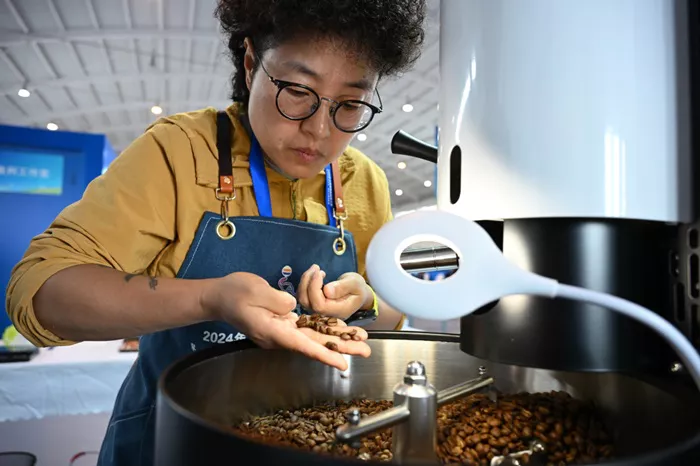Key players in China’s rapidly expanding coffee market are recalibrating their strategies to maintain a competitive edge, transitioning from price-based approaches to a quality-centric focus.
Brands such as Cotti Coffee, Luckin Coffee, Tims China, and Starbucks are adopting distinct approaches to capture market share in the booming coffee sector. The “China Coffee Industry Report 2024″ from the World Federation of Chinese Catering Industry underscores this growth, emphasizing shifting consumer preferences across the nation.
China’s coffee production, primarily based in Yunnan province, produces over 100,000 metric tons annually, but domestic supply falls short of meeting demand. In response, coffee imports surged by 20% year-on-year in 2023, reaching 150,000 tons and a total value of nearly 6 billion yuan ($840.6 million).
The report highlights a remarkable 167% increase in coffee consumption over the last decade, with consumption now at 350,000 tons. Freshly ground coffee and retail coffee lead in popularity, with freshly ground coffee alone valued at over 120 billion yuan, contributing to a total market exceeding 150 billion yuan. This shift suggests a growing preference for freshly ground coffee, projected to increase its market share from 40% to over 80% soon.
Among the most ambitious, Cotti Coffee has announced plans to grow from 10,000 to 50,000 stores by 2025. To achieve this goal, the company intends to open 40,000 new stores within 18 months, leveraging partnerships with 51 retailers, including convenience chain Meiyijia, fast-food brand Wallace, electronics retailer Suning, and budget hotel chain Home Inn. Through these collaborations, Cotti gains access to more than 100,000 retail locations nationwide, enabling expansion in both urban and rural areas.
Alongside these partnerships, Cotti Coffee is bolstering its supply chain infrastructure by constructing production facilities and upgrading store operations. CEO Li Yingbo has stated that Cotti will continue its low-price strategy, maintaining its 9.9 yuan offerings for the next three years to attract budget-conscious consumers.
Yet, Cotti’s adherence to a low-cost model contrasts with the trend among other brands toward a quality-first approach. Zhu Danpeng, an independent food and beverage analyst, noted that low pricing alone may not sustain profit margins, as operational costs in coffee production and retail remain high. “Without profits, there’s no room for service, innovation, or customer engagement,” he explained.
Luckin Coffee, known for popularizing low-cost coffee, has also started to pivot toward quality. Initially, Luckin captured significant attention with its 9.9 yuan offerings, helping it grow to one of China’s largest coffee chains and winning consumer loyalty. However, financial strain has prompted the company to refine its strategy. In the second quarter, Luckin’s revenue grew by 35.5% year-on-year to 8.403 billion yuan, though same-store sales for self-operated locations fell by 20.9%, signaling challenges in sustaining low prices amid fierce competition.
Recognizing the limits of discount-driven growth, Luckin is now scaling back on price promotions, emphasizing quality and improving its supply chain. The company sources beans from premium regions, including Brazil, Ethiopia, and Yunnan, ensuring consistent product quality. In July, Luckin opened its 20,000th store in Beijing, marking an investment in expansion and supply chain refinement, including a 3 billion yuan Innovation and Production Center in Shandong province to support a long-term quality focus.
Meanwhile, Tims China has avoided direct competition on pricing, emphasizing quality through bundled meal options. Operating 907 stores across 71 cities, the brand prioritizes customer value with combo meals that pair coffee with freshly prepared food, creating a unique proposition in the market.
With each brand employing a distinct approach, China’s coffee market is set for diverse growth as companies balance expansion with a renewed emphasis on quality and value.
Related Topics:
Starbucks and Keurig Adjust to Frugal Coffee Lovers as Prices Soar
A New Brew in Town: Biggby Coffee Arrives in Sheffield Lake
RECAPS: Brewing a Greener Future for Coffee Capsule Recycling


